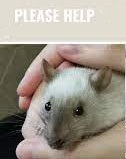Taiwan On Outbreak Alert After Research Worker Contracts New Zoonotic Delta Variant After Getting Bitten By A COVID-19 Infected Laboratory Mouse!
Source: Breaking COVID-19 News Dec 10, 2021 3 years, 4 months, 1 week, 13 hours, 57 minutes ago
Breaking COVID-19 News: Taiwan health authorities reported in the last 12 hours that the country is now on a high outbreak alert after a female research worker got bitten by a laboratory mouse that was infected with the COVID-19 disease for research purposes.

To make matters worse, the female worker did not follow proper safety protocols after the bite and had not reported the incident till she had developed symptoms days later. She did not quarantine herself after the bite and for days had exposed herself to numerous people until she had developed symptoms.
The case of the worker at a high-security laboratory was confirmed as the island’s first local case in more than a month. Many other suspected cases are now being tested and other possible cases are being investigated including extensive contact tracing.
The research worker, a woman in her 20s, tested positive for COVID this week after coming into contact with the virus during her work at Academia Sinica, Taiwan’s top research institute, in mid-November, Health Minister Chen Shih-chung said at a quickly organized briefing Thursday evening.
It was reported that she had not traveled abroad recently and had received two doses of Moderna Inc.’s vaccine.
Health Minister Chen Shih-chung said at a briefing this morning that it was confirmed that the female worker had been bitten on two separate occasions by a laboratory mouse infected with COVID, but said further investigation was needed to determine whether the bites had been the source of the virus’s transmission.
Authorities believe she is likely infected with the delta variant but scientist at the laboratory are concerned as the virus had mutated slightly while being in the murine host and could be a totally new zoonotic variant with newly acquired mutations on it.
Detailed testing and genomic sequencings are currently underway.
This alarmingly lab leak threatens to undo Taiwan’s success in stamping out COVID-19 outbreaks, and underscores the difficulty of eliminating the pathogen, a goal some places including mainland China and Hong Kong are still aiming for.
Prior to Thursday’s confirmed infection, Taiwan’s last confirmed local case was on Nov. 5. While maintaining tough entry and quarantine measures at the border, the government has gradually eased restrictions on businesses and entertainment over the past few months, and domestic activity has largely normalized.
The country has reported just over 14,500 domestic cases of Covid-19 and 848 deaths since the beginning of the pandemic. No new domestic cases were reported Friday.
Taiwan health authorities have identified 94 people who came into contact with the lab worker since she was infected mainly colleagues and close friends and placed them in quarantine.
According to
Breaking COVID-19 News, some had already developed symptoms but are awaiting test results. Eighty of them however have since tested negative, and she resigned from her job earlier this month.
Health authorities are worried that the lab worker’s infection will trigger a new widespre
ad outbreak as some contacts have already started showing symptoms and many more cannot be traced yet.
The female worker worked at Academia Sinica’s Genomics Research Center, which has one of the 18 Biosafety Level-3 laboratories in Taiwan, the second-highest security rating.
Research conducted at the lab included collecting and propagating pathogens, cell-based microbiological and immunological tests, and evaluating the efficacy of vaccines and adjuvants in small animal models, according to its website.
Although the risk of animals spreading COVID to humans is considered low based on available information, according to the U.S. Centers for Disease Control and Prevention, further studies are needed to understand if and how different animals could be impacted by the virus.
Recent cases of reverse zoonotic transmissions in Denmark alarmingly showed a new variant with concerning mutations arise in minks and most of the human workers at the farms who contracted the variant got seriously sick but fortunately the outbreak was effectively controlled in time.
Although rare, some coronaviruses that infect animals can spread to people before transmitting via human-to-human contact, the CDC said like what happened with SARS-CoV-2, it added, which likely originated in bats.
Besides the Denmark mink incident, since the pandemic started, there is no other evidence that animals have played a significant role in spreading COVID, said the U.S. CDC.
A research scientist at the University of North Carolina at Chapel Hill was bitten by a mouse last year, causing potential exposure to a strain of the virus that causes COVID-19 that had been adapted for growth in mice.
Although the bite didn’t break the skin, the scientist underwent 14 days of home quarantine and no further information about his health was included in incident reports.
In the case of the female worker in Taiwan, she is currently exhibiting moderate disease conditions and is currently hospitalized in an isolated ward.
Thailand Medical News will provide more updates on this developing story.
 Please help to sustain this site and also all our research and community initiatives by making a donation. Your help means a lot and helps saves lives directly and indirectly and we desperately also need financial help now.
Please help to sustain this site and also all our research and community initiatives by making a donation. Your help means a lot and helps saves lives directly and indirectly and we desperately also need financial help now.
https://www.thailandmedical.news/p/sponsorship
For more
Breaking COVID-19 News, keep on logging to Thailand Medical News.

